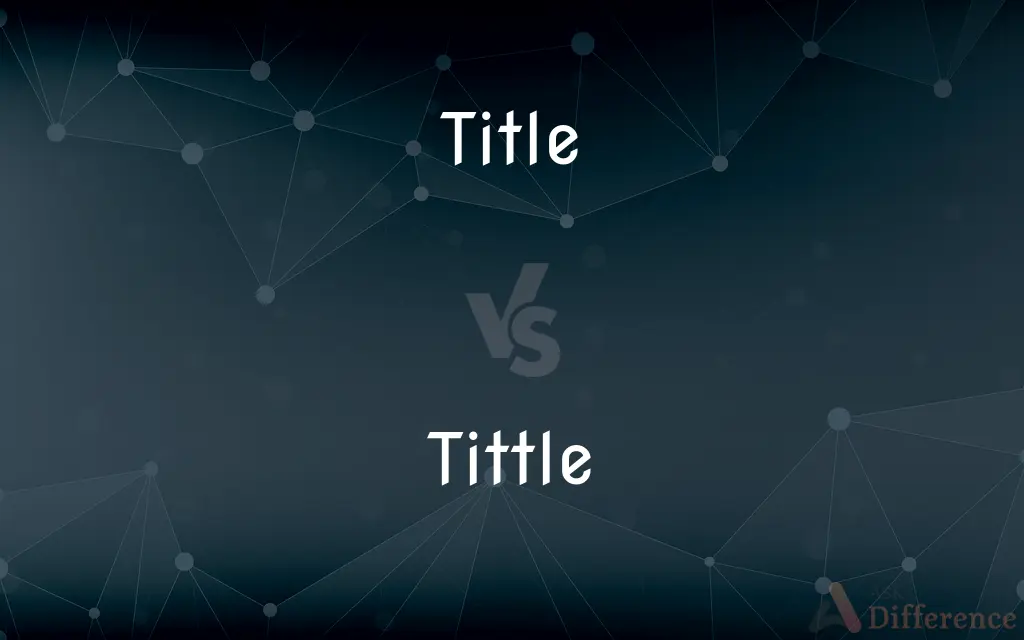Title vs. Tittle — What's the Difference?
By Tayyaba Rehman — Updated on September 7, 2023
"Title" refers to the name or designation for something, such as a book or a job role. "Tittle" is a small mark or dot, often referring to the dot over the letters 'i' and 'j.'

Difference Between Title and Tittle
Table of Contents
ADVERTISEMENT
Key Differences
"Title" generally refers to the name of something, such as a book, article, or a person's job position. On the other hand, "Tittle" is the tiny dot or mark placed over the lowercase letters 'i' and 'j' in several languages, including English.
When it comes to importance, "Title" often conveys a lot about the content or position it represents. "Tittle," although small, plays a crucial role in differentiating certain letters and thus contributing to language precision.
In formal and legal documents, the "Title" is extremely important, as it can set the tone or context for the text that follows. Contrastingly, the "Tittle" is often overlooked but serves to clarify and avoid confusion in written words that include 'i' or 'j.'
In coding and digital media, "Title" is often an essential meta element that helps with Search Engine Optimization (SEO) and user navigation. "Tittle" may appear in digital fonts and is generally included to adhere to traditional typography.
Comparison Chart
Meaning
Name or designation
Dot over 'i' and 'j'
ADVERTISEMENT
Importance
Conveys main idea
Adds clarity to letters
Use in Text
Headings, labels
Appears in body text
Legal Relevance
Critical in documents
Usually not legally relevant
Digital Presence
SEO, meta elements
Typography
Compare with Definitions
Title
Name of a book or article.
The title of the book is War and Peace.
Tittle
A small diacritic mark.
The tittle is crucial in distinguishing 'i' from 'l.'
Title
A term used to address someone.
Your title is Doctor, isn't it?
Tittle
A tiny amount or part of something.
He didn't care a tittle about the criticism.
Title
A formal designation or rank.
He holds the title of Chief Executive Officer.
Tittle
The dot over 'i' and 'j.'
Never forget the tittle when writing these letters.
Title
Legal ownership of property.
The title of the house is in her name.
Tittle
A point of minor detail in an argument or discussion.
The debate focused too much on tittles and not enough on the main issue.
Title
The heading of a statute or chapter.
The title clearly states the purpose of the law.
Tittle
In typography, a part of lowercase 'i' and 'j.'
A well-designed font keeps the tittle clear and visible.
Title
A title is one or more words used before or after a person's name, in certain contexts. It may signify either generation, an official position, or a professional or academic qualification.
Tittle
A tittle or superscript dot is a small distinguishing mark, such as a diacritic in the form of a dot on a lowercase i or j. The tittle is an integral part of the glyph of i and j, but diacritic dots can appear over other letters in various languages.
Title
The name of a book, composition, or other artistic work
The author and title of the book
Tittle
A tiny amount or part of something
The rules have not been altered one jot or tittle since
Title
A name that describes someone's position or job
Leese assumed the title of director general
Tittle
A small diacritic mark, such as an accent, vowel mark, or dot over an i.
Title
The position of being the champion of a major sports competition
Davis won the world title for the first time in 1981
Tittle
The tiniest bit; an iota.
Title
A right or claim to the ownership of property or to a rank or throne
The buyer acquires a good title to the goods
A grocery family had title to the property
Tittle
(typography) Any small dot, stroke, or diacritical mark, especially if part of a letter, or if a letter-like abbreviation; in particular, the dots over the Latin letters i and j.
Title
(in church use) a fixed sphere of work and source of income as a condition for ordination.
Tittle
(by extension) A small, insignificant amount (of something); a modicum or speck.
Title
Give a name to (a book, composition, or other work)
A report titled The Lost Land
Tittle
(Scotland) To chatter.
Title
An identifying name given to a book, play, film, musical composition, or other work.
Tittle
A particle; a minute part; a jot; an iota.
It is easier for heaven and earth to pass, than one tittle of the law to fail.
Every tittle of this prophecy is most exactly verified.
Title
A general or descriptive heading, as of a book chapter.
Tittle
A tiny or scarcely detectable amount
Title
A written work that is published or about to be published
The titles in the publisher's fall catalog.
Title
A division of a legal code, generally consisting of multiple related statutes.
Title
Often titles Written material to be read by viewers that is included in a film or television show, typically presenting credits, narration, or dialogue.
Title
A written piece of translated dialogue superimposed at the bottom of the frame during a film; a subtitle.
Title
A formal appellation attached to the name of a person as a sign of office, rank, profession, or hereditary privilege.
Title
A descriptive name; an epithet
The dubious title of the worst bowler in the league.
Title
A right or claim, or the basis of a right or claim
"The weight of a fish is commonly its only title to fame" (Henry David Thoreau).
Title
A form of ownership free of valid claims by other parties.
Title
The aggregate evidence that gives rise to a legal right of possession or control.
Title
The instrument, such as a deed, that constitutes this evidence.
Title
Sports & Games A championship
Which boxer won the heavyweight title?.
Title
A source of income or area of work required of a candidate for ordination in the Church of England.
Title
A Roman Catholic church in or near Rome having a cardinal for its nominal head.
Title
To give a name or title to.
Title
An appellation given to a person or family to signify either veneration, official position, social rank, the possession of assets or properties, or a professional or academic qualification. See also :Category:Titles
Title
(property law) Legal right to ownership of a property; a deed or other certificate proving this.
A good title to an estate, or an imperfect title
Title
In canon law, that by which a beneficiary holds a benefice.
Title
A church to which a priest was ordained, and where he was to reside.
Title
The name of a book, film, musical piece, painting, or other work of art.
I know the singer's name, but not the title of the song.
Title
A publication.
The retailer carries thousands of titles.
Buyers of the new video game console can choose from three bundled titles.
Title
A section or division of a subject, as of a law or a book.
Title
A written title, credit, or caption shown with a film, video, or performance.
The titles scrolled by too quickly to read.
Title
(bookbinding) The panel for the name, between the bands of the back of a book.
Title
The subject of a writing; a short phrase that summarizes the entire topic.
Title
A division of an act of law
Title II of the USA PATRIOT Act
Title
(sports) The recognition given to the winner of a championship in sports.
Title
A long title.
Title
A short title.
Title
(transitive) To assign a title to; to entitle.
Title
An inscription put over or upon anything as a name by which it is known.
Title
The inscription in the beginning of a book, usually containing the subject of the work, the author's and publisher's names, the date, etc.
Title
The panel for the name, between the bands of the back of a book.
Title
A section or division of a subject, as of a law, a book, specif. (Roman & Canon Laws), a chapter or division of a law book.
Title
An appellation of dignity, distinction, or preëminence (hereditary or acquired), given to persons, as duke marquis, honorable, esquire, etc.
With his former title greet Macbeth.
Title
A name; an appellation; a designation.
Title
That which constitutes a just cause of exclusive possession; that which is the foundation of ownership of property, real or personal; a right; as, a good title to an estate, or an imperfect title.
Title
A church to which a priest was ordained, and where he was to reside.
Title
To call by a title; to name; to entitle.
Hadrian, having quieted the island, took it for honor to be titled on his coin, "The Restorer of Britain."
Title
A heading that names a statute or legislative bill; may give a brief summary of the matters it deals with;
Title 8 provided federal help for schools
Title
The name of a work of art or literary composition etc.;
He looked for books with the word `jazz' in the title
He refused to give titles to his paintings
I can never remember movie titles
Title
A general or descriptive heading for a section of a written work;
The novel had chapter titles
Title
The status of being a champion;
He held the title for two years
Title
A legal document signed and sealed and delivered to effect a transfer of property and to show the legal right to possess it;
He signed the deed
He kept the title to his car in the glove compartment
Title
An identifying appellation signifying status or function: e.g. Mr. or General;
The professor didn't like his friends to use his formal title
Title
An established or recognized right;
A strong legal claim to the property
He had no documents confirming his title to his father's estate
He staked his claim
Title
(usually plural) written material introduced into a movie or TV show to give credits or represent dialogue or explain an action;
The titles go by faster than I can read
Title
An appellation signifying nobility;
`your majesty' is the appropriate title to use in addressing a king
Title
An informal right to something;
His claim on her attentions
His title to fame
Title
Give a title to
Title
Designate by an identifying term;
They styled their nation `The Confederate States'
Common Curiosities
Is Title a noun or verb?
Title can be both a noun and a verb.
What is a Tittle?
A tittle is the small dot above the letters 'i' and 'j.'
Is Tittle ever a verb?
No, tittle is typically a noun.
How is Tittle used in language?
Tittle is mainly used in written language to differentiate 'i' and 'j.'
What is a Title?
A title is the name or designation of something.
Can Title be abbreviated?
Sometimes, as in "Mr." for "Mister."
How is Title used in academia?
Title is used for research papers, articles, and ranks like Professor.
Is Tittle case-sensitive?
No, it's always lowercase for 'i' and 'j.'
Is Tittle ever omitted?
Yes, in some fonts or handwriting styles.
Do Titles have legal implications?
Yes, especially in property and contractual matters.
What's the plural of Title?
Titles.
Can Title be a direct object?
Yes, e.g., "I read the title."
Do Tittles have legal implications?
No, tittles are not usually legally relevant.
Is Title case-sensitive?
It can be, depending on the context.
What's the plural of Tittle?
Tittles.
Share Your Discovery

Previous Comparison
Thunderous vs. Thundering
Next Comparison
Cheezy vs. CheesyAuthor Spotlight
Written by
Tayyaba RehmanTayyaba Rehman is a distinguished writer, currently serving as a primary contributor to askdifference.com. As a researcher in semantics and etymology, Tayyaba's passion for the complexity of languages and their distinctions has found a perfect home on the platform. Tayyaba delves into the intricacies of language, distinguishing between commonly confused words and phrases, thereby providing clarity for readers worldwide.
















































